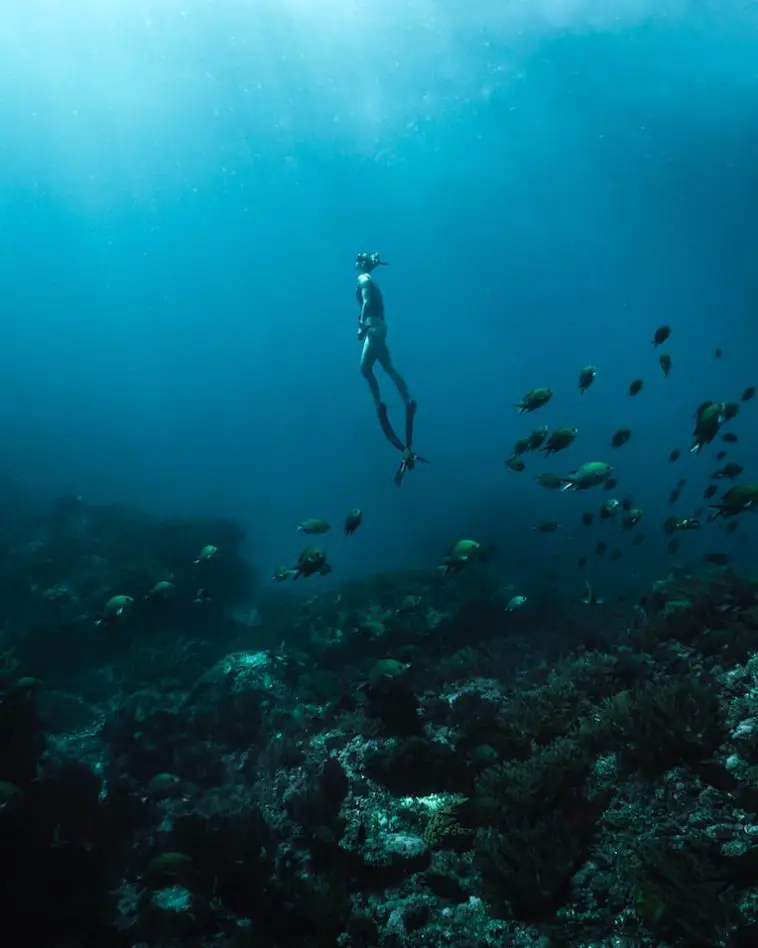Do you dream of diving deep into the depths of the ocean, exploring its mysteries and taking on exciting welding projects? If so, then becoming an underwater welder may be the perfect job for you! This lucrative career path offers a unique combination of physical work, exploration and skill. In this article, we will discuss what it takes to become an underwater welder and provide tips on how to get started. So grab your scuba gear – it’s time to dive in!
Page Contents
How to Become an Underwater Welder
Underwater welding is an exciting and challenging career path, offering a unique experience to those looking for something different in their work life. To become an underwater welder, you will need to have the right qualifications, training and certifications.
Here’s some tips on how to get started:
First of all, it’s important that you have the appropriate knowledge needed for this job – such as being familiar with electrical engineering or having a strong knowledge of metallurgy. The more experience and education you have in these areas, the better your chances are of succeeding as an underwater welder. Additionally, make sure that you keep up-to-date on any new developments in welding technology or materials science so that your skills remain relevant.
It is also essential that anyone wanting to pursue this profession has completed safety training courses specific to working under water – such as basic SCUBA diving classes and first aid certification – before they can even begin applying for jobs. Once you’ve achieved these certifications there are many online courses available which offer further instruction into topics related specifically to underwater welding like hyperbaric chamber operations and remote atmospheric pressure systems (RAPS). You should also strive to gain hands-on experience by participating in internships or apprenticeships at established companies if possible; this will give employers confidence when considering hiring you full time. Finally make sure that when it comes time apply for positions you emphasize all aspects of your technical skill set including customer service abilities if applicable since many welders interact with clients directly during projects!
Day in the Life of an Underwater Welder
Being an underwater welder is a unique and fascinating job. From the deep sea dives to the intricate welding work, it can be both physically and mentally demanding. Each day brings its own set of challenges that must be met with skill, precision, and experience.
The typical duties of an underwater welder include making repairs or carrying out new construction on ships, offshore platforms, pipelines, dams or other structures located beneath the surface of water bodies such as seas or rivers. This requires specialized training in wet welding techniques used for working in extreme conditions underwater. They’ll need to wear protective gear such as wetsuits or diving suits depending on the depth they are operating at and will also use a variety of tools including welding machines and cutting torches when completing tasks.
A typical day for an underwater welder might start with checking all their equipment before heading down into the depths below the surface where they’ll carry out their work either alone or alongside other divers if necessary. Once there they’ll spend most of their time welding parts together using either arc welders which require electricity powered from above-water generators; oxyacetylene torch which uses compressed oxygen to create heat; plasma arc cutter which uses electricity to cut through metal; gas tungsten arc welders (TIG) which use nonconsumable electrodes; or shielded metal arc welders (MMAW) which use consumable electrodes melted by electric arcs produced between them and pieces being joined together.
When not actively engaged in welding activity underwater welders may have additional maintenance duties such as cleaning surfaces beforehand for optimum results during operations – this could involve scrubbing away rust from pipes etc., with wire brushes – monitoring levels throughout operation process – this includes air pressure within tanks/helmets/suits so no leaks occur – inspecting equipment after completion if all tests were successful – ensuring operational safety standards have been adhered too etc.. After all has been completed successfully then post-dive debriefing would take place where any issues encountered during operations can be discussed amongst team members who were present along with supervisors/managers assigned overseeing project outcomes etc..
Working Conditions for Underwater Welders
Underwater welders have some of the most unique and challenging working conditions in the world. Because they spend a majority of their time working under water, safety is always a priority when it comes to this job. Welders must be physically fit and able to endure long periods of time underwater using specialized breathing equipment.
These professionals are required to wear thick protective gear such as wetsuits and helmets while submerged in order to protect them from extreme temperatures and hazards like sharp metal objects. It’s not uncommon for welders to work at depths up to 300 feet – any deeper requires specialized training and additional certification.
The work itself can be demanding, as welding requires intense concentration so that each joint or gap is joined together properly. Additionally, non-destructive testing (NDT) methods may need to be used throughout the process in order for welds meet industry standards in terms of quality control. This means that welders need an eye for detail even when operating within tight spaces or deep waters with limited visibility due to murky sea life or sediment build-up on the surface below them.
Welding technicians also need great problem solving skills since they will often come across difficult challenges during a project which can require quick thinking decisions being made onsite without much help from others around them – making mistakes could cost both money and resources if corrective measures aren’t taken quickly enough! In addition, these professionals must understand how different materials react together when heated up through welding processes – something which takes significant practice over many years before becoming proficient enough at it professionally!
Salary Expectations for Underwater Welders
Underwater welding is a highly specialized and skilled job that can be quite lucrative for those who choose to pursue it. It requires intense training, certification, and often includes underwater dives in order to properly perform the task at hand. Those who have achieved this status are generally well compensated for their efforts, as they provide a vital service that demands attention to detail and safety protocols.
The salary of an underwater welder will depend on several factors including experience level, location of work, and any additional certifications held by the individual. On average across industries such as marine construction or offshore oil drilling rigs those with basic certification can expect salaries ranging between $30-50 per hour depending on location. Experience underwater welders may earn up to double this amount due to their superior skillset.
In addition to base pay many employers offer bonuses or incentives based upon productivity and performance evaluations which can increase overall earnings substantially during any given year of employment. These payments are typically awarded when specific goals are met within set time frames allowing employees the opportunity for additional income should they meet all criteria outlined by their employer’s standards.
Benefits packages vary by employer but generally include health insurance coverage along with paid leave days in accordance with industry regulations pertaining specifically to underwater welding jobsites where hazardous conditions may be encountered from time-to-time throughout regular course of duties performed daily at remote locations around the world . A 401K plan may also be available providing workers with retirement options not always available through other more traditional types of employment opportunities found elsewhere in today’s global marketplace .
Health Hazards Associated with Underwater Welding
Underwater welding is a dangerous job, as it presents its own set of health hazards to the person doing the work. Working in an underwater environment that often contains unpredictable and hazardous conditions can be extremely risky for welders. The potential risks they face include exposure to gases, electric shock, and physical strain from heavy equipment use.
The most common risk associated with underwater welding is exposure to toxic gases like carbon dioxide or nitrogen which are released when welding in a pressurized chamber or from burning materials such as lead-based paints. These gases can cause irritation of the eyes, nose, throat and lungs if inhaled; long-term effects may even include serious respiratory illnesses such as asthma or COPD. Additionally, welders must also take precautions against electric shock caused by faulty wiring or water leaks in the electrical system of their work area. This could potentially result in severe injuries including burns and electrocution if not handled properly.
Finally, there is also a significant amount of physical strain involved with working underwater due to wearing bulky rubber suits while handling heavy tools and equipment; this could lead to fatigue over time which increases the chances of injury on the job site itself especially when combined with other hazardous factors present within an underwater workspace.
• Exposure to Toxic Gases
• Electric Shock Risk
• Physical Strain
Benefits of Becoming an Underwater Welder
Underwater welding is a challenging, yet rewarding field to enter. People who want to pursue this line of work will find that it’s full of exciting opportunities and great benefits. Here are some of the advantages you can expect when becoming an underwater welder:
• Financial Security: Underwater welders have the potential for long-term financial security as they typically earn higher wages than other tradespeople due to the complexity and dangers associated with their job.
• A Variety Of Working Environments: As an underwater welder, you could find yourself working in many different places from deep sea rigs to shallow waters close to shorelines. This adds variety and excitement into your career path which keeps things interesting!
• Opportunities For Growth And Development: Every day brings new challenges as no two projects are ever alike so there are always opportunities for growth and development in knowledge, skills, and experience – something any ambitious person would appreciate.
• Exposure To Unique Technology And Equipment: When entering this profession you gain access to some of the most modern technologies used in space exploration or submarine construction – allowing you learn how these systems operate while honing your expertise on them over time.
• Increased Job Satisfaction And Flexibility: Working underwater can be incredibly satisfying not just because it pays well but also because it gives workers more freedom than traditional jobs – such as flexible hours or days off when needed without having anyone question why they chose this lifestyle choice. Moreover, those looking for a more meaningful purpose in life may find that welding provides them with exactly what they need by helping build structures necessary for both industry progressions and social welfare programs worldwide!
Wrapping it Up!
Overall, becoming an underwater welder is a rewarding and lucrative career path. It requires specialized training and certification, as well as the ability to work in challenging conditions. Underwater welding offers excellent pay and benefits, however it can be dangerous due to the potential health hazards associated with underwater welding such as decompression sickness. Ultimately though, those willing to take on the challenge of being an underwater welder will find that their hard work pays off both literally and figuratively.
how to become an underwater welder
Frequently Asked Questions!
Q: What qualifications do I need to become an underwater welder?
A: To become an underwater welder, you’ll need to have a valid welding certification from a recognized organization, such as the American Welding Society. You must also have specialized training in deep sea welding techniques and safety protocols.
Q: How much does an underwater welder make?
A: Underwater welders typically earn competitive salaries that can range from $50K-$150K per year depending on experience, location and the type of project they are working on.
Q: Is it dangerous to be an underwater welder?
A: As with all types of welding, there are risks associated with being an underwater welder; however, by following strict safety protocols and taking proper precautions these risks can be greatly minimized.
Q: How long does it take to become certified as an underwater welder?
A: The length of time it takes to complete the necessary training and get certified varies depending on individual circumstances; generally speaking though it usually takes between 1-2 years before one is eligible for certification as an underwater welder.
Q: Are there any restrictions when applying for jobs as a professional diver/welding technician?
A : While most employers require applicants for diving positions to meet certain physical requirements (such as good eyesight), some may place additional restrictions or qualifications related to age or prior experience level so its important that potential applicants consult job postings carefully before applying.




